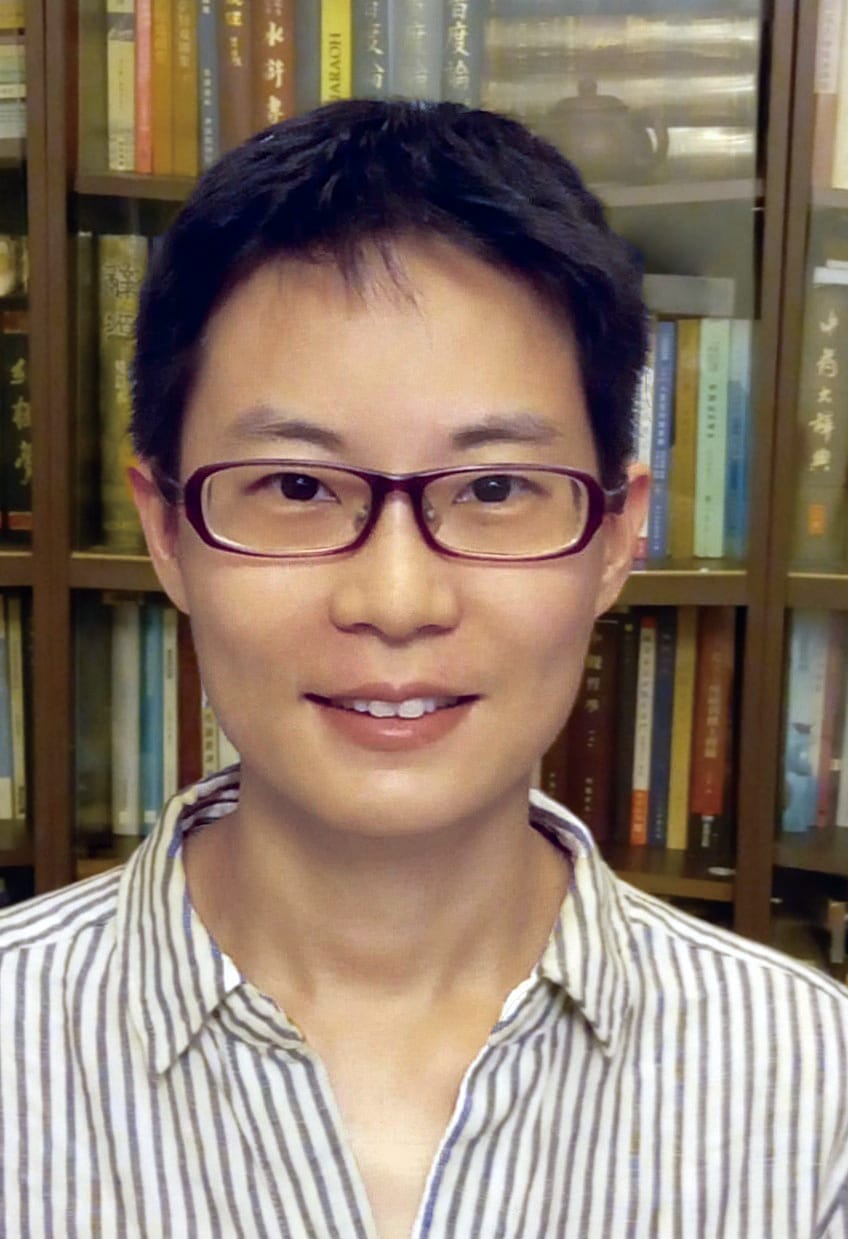
Jenny HUNG (洪真如)
Ph.D., The Hong Kong University of Science and Technology (2013) Ph.D., Lingnan University (2018)
Tel: 23587761
Email: hmjhung@ust.hk
Room No: 2349
Dr. Jenny Hung is an assistant professor of philosophy and religion in the Division of Humanities at HKUST. She has two PhDs, one in philosophy, another in nanophysics. She investigates the nature of the self from both the Western and Eastern perspectives, aiming to answer the most fundamental questions of human existence, such as: “What are we?” “How do we persist?” She was a visiting scholar at the University of Texas at Austin, the University of California, Riverside, and the Australian National University. She also had the opportunity to collaborate with John Perry at Stanford University, exploring the concept of self across different traditions, thanks to a grant. Additionally, she was recently awarded an ECS grant by the Hong Kong Research Grants Council for the project titled "Between Buddha-nature and Emptiness: The Peak Era of Chinese Buddhism."
Research Interests
Daoism, Buddhism, Philosophy of Mind, Metaphysics, Philosophy of Artificial Intelligence.
Representative Publications
Books
-
Hung, J. Between Buddha-nature and Emptiness: The Peak Era of Chinese Buddhist Philosophy. Oxford University Press. (Contract Signed)
-
Hung, J. What am I? The Self and Oneness in Chinese Philosophy. (Under Review)
-
Hung, J. 出世與入世之間 Between Secularity and Spirituality. (Under Review)
Peer-reviewed Journal Papers (Philosophy)
- Hung, J. (2026). Better be a Zombie? The Value of Consciousness in Early Buddhism. Oxford Studies in Philosophy of Mind, Vol. 5.
- Hung, J. (2025). We Are the Same Mind! A Study of Zongmi’s Idea of the True Mind. Philosophy East and West, 75:4. https://muse.jhu.edu/article/973413
- Hung, J. (2025). Is Emptiness Non-empty? Jizang’s Conception of Buddha-nature. Religions, 16(2), 184. https://doi.org/10.3390/rel16020184
- Hung, J. (2025). In Search of Qi Immortality: A Study of Heshanggongʼs Commentary on the Daodejing. Religions, 16(3): 383. https://doi.org/10.3390/rel16030383
- Hung, J. (2024). Reflexive Awareness and Reflexivity: An Identity Model of Reflexive Awareness with Korta and Perry’s Reflexive-Referential Theory of Content. Synthese. 204:30 https://doi.org/10.1007/s11229-024-04688-8
- Hung, J. (2023). Phenomenal Concepts and Animal Consciousness. Philosophical Psychology. 36 (3): 580–600. https://doi.org/10.1080/09515089.2022.2072722
- Gao J., Leung, H., Wu, W. W. Y., Hung, J., Chang, C., Sik, H. H. (2023). Long-Term Inquiry Meditation Reduces EEG Spectral Dynamics in Self-Schema Processing. Heliyon. 9(9), E20075. https://doi.org/10.1016/j.heliyon.2023.e20075
- Hung, J. (2020). Is Zhuangzi a Wanton? Observation and Transformation of Desires in the Zhuangzi. Dao: A Journal of Comparative Philosophy. 19 (2): 1–17. https://doi.org/10.1007/s11712-020-09723-2
- Hung, J. (2020). A Gricean Interpretation of Nāgārjuna’s Catuskoti and the No-thesis View. History and Philosophy of Logic. Vol. 41 (3): 217–235. https://doi.org/10.1080/01445340.2020.1786266
- Hung, J. (2020). Is Dharma-nature Identical to Ignorance? A study of “ji 即” in early Tiantai Buddhism. Asian Philosophy. Issue 30 (4): 307–323. http://dx.doi.org/10.1080/09552367.2020.1846873
- Hung, J. (2019). The Theory of the Self in the Zhuangzi: A Strawsonian Interpretation. Philosophy East and West 69:2, 376-394. https://muse.jhu.edu/article/731256
- Hung, J. (2018). The Early Yogācāra Theory of No-self. Asian Philosophy. 28.4: 316–331. https://doi.org/10.1080/09552367.2018.1543055
Peer-reviewed Journal Papers (Physics)
- Wang X., Gao W., Hung J., and Tam W. Y. (2014). Optical activities of large-area SU8 micro-spirals fabricated by multi-beam holographic lithography., Appl. Opt. 53, 2425–2430. https://doi.org/10.1364/AO.53.002425
- Hung J., Gao W., and Tam W. Y. (2011). Optical activities of micro-spiral photonic crystals fabricated by multi-beam holographic lithography. J. Opt. 13, 095101. https://iopscience.iop.org/article/10.1088/2040-8978/13/9/095102/meta
- Hung J., Chan P. S., Sun C., Ho C. W. and Tam W. Y. (2010). Doubly slanted layer structures in holographic gelatin emulsions: solar concentrators. J. Opt. 12 045104. https://doi.org/10.1088/2040-8978/12/4/045104
- Hung J., Kok M., Tam W. Y. (2009). Complete photonic bandgaps in the visible range from spherical layer structures in dichromate gelatin emulsions. App. Phys. Lett. 94, 014102. https://aip.scitation.org/doi/10.1063/1.3064165
Book Chapters (Philosophy)
- Hung, J. (Under Review). From Understanding to Contemplating Emptiness: Jizang’s Notion of Zhengguan 正觀. In “Buddhist Philosophy between India and China: From Madhyamaka to Sanlun.” Rafal Stepien (Ed.). Oxford University Press.
- Hughes J. J, Sarbacker S., Tormen F., Hung, J. (Under Review). Buddhism, AI, and Human Enhancement. In “Through a Buddhist Lens: Buddhist Perspectives on Consciousness, Evolution, and AI.” Chiara Mascarello and Francesco Tormen (Eds.).
- Adam, M., Tormen, F., Hung, J., Goodman, C. (Under Review). Can AI systems be Phenomenally Consciousness? In “Through a Buddhist Lens: Buddhist Perspectives on Consciousness, Evolution, and AI.” Chiara Mascarello and Francesco Tormen (Eds.).
- Hung, J. (Forthcoming). On Zhu Xi’s Ideas of Ethical Ground and the Value of Life. In “Dao Companion to Confucian Applied Ethics.” Kam-Por Yu, Julia Tao, Rina Camus (Eds.). Springer Nature.
- Hung, J. (Forthcoming). Introspection in Early Buddhism. In “The Routledge Handbook of Introspection.” Anna Giustina (Ed.). Routledge.
- Hung J. (Forthcoming). An Analysis of Jizang's Idea of Reality. In “Reading Primary Sources in Asian Philosophies.” Malcolm Keating (Ed.). Bloomsbury.
- Hung J. (2024). Evil, Suffering, and Meditation in the Tiantai School. In Volume II, “Chinese Philosophy and Its Thinkers: From Ancient Times to the Present Day.” Selusi Ambrogio & Dawid Rogacz (Eds.). pp. 77–86. Bloomsbury.
- Hung, J. (2011). The Three-fold Interpretation of Chih-I’s ‘Ignorance Equals Nature of Dharma’ (in Chinese). In “Dialogues in Chinese, Japanese and Korean T'ien-T'ai Buddhism.” Tian Xiang Ma (Ed.). pp. 150–165. Beijing, Renmin Publisher.
Grants and Funds
2024 – 2027 Principal Investigator, “Between Buddha-nature and Emptiness: The Peak Era of Chinese Buddhism.” Early Career Scheme (ECS), The Hong Kong Research Grants Council (HKD 340,249)
2024 Internal Research Support Grant, HKUST (HKD 80,000)
2020 – 2024 Research Fund, “The Self: Eastern and Western Traditions”, (collaborate with John Perry). Stanford University (USD 33,000)
2021 Start Up Fund, HKUST (HKD 100,000)
2020 Research Fund Award, New York University, Abu Dhabi (USD 5,000)